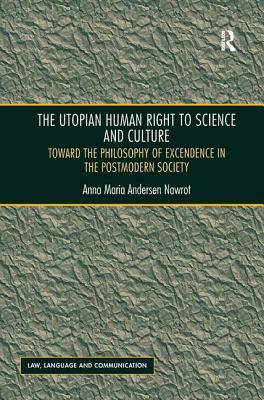
En raison d'une grêve chez bpost, votre commande pourrait être retardée. Vous avez besoin d’un livre rapidement ? Nos magasins vous accueillent à bras ouverts !
- Retrait gratuit dans votre magasin Club
- 7.000.000 titres dans notre catalogue
- Payer en toute sécurité
- Toujours un magasin près de chez vous
En raison de la grêve chez bpost, votre commande pourrait être retardée. Vous avez besoin d’un livre rapidement ? Nos magasins vous accueillent à bras ouverts !
- Retrait gratuit dans votre magasin Club
- 7.000.0000 titres dans notre catalogue
- Payer en toute sécurité
- Toujours un magasin près de chez vous
The Utopian Human Right to Science and Culture
Toward the Philosophy of Excendence in the Postmodern Society
Anna Maria Andersen Nawrot
290,45 €
+ 580 points
Description
This book explores the question of whether the ideal right to science and culture exists. It proposes that the human right to science and culture is of a utopian character and argues for the necessity of the existence of such a right by developing a philosophical project situated in postmodernity, based on the assumption of 'thinking in terms of excendence'. The book brings a novel and critical approach to human rights in general and to the human right to science and culture in particular. It offers a new way of thinking about access to knowledge in the postanalogue, postmodern society. Inspired by twentieth-century critical theorists such as Levinas, Gadamer, Bauman and Habermas, the book begins by using excendence as a way of thinking about the individual, speech and text. It considers paradigms arising from postanalogue society, revealing the neglected normative content of the human right to science and culture and proposes a morality, dignity and solidarity situated in a postmodern context. Finally the book concludes by responding to questions on happiness, dignity and that which is social. Including an Annex which presents the author's private project related to thinking in the context of the journey from 'myth to reason', this book is of interest to researchers in the fields of philosophy and the theory of law, human rights, intellectual property and social theory.
Spécifications
Parties prenantes
- Auteur(s) :
- Editeur:
Contenu
- Nombre de pages :
- 232
- Langue:
- Anglais
- Collection :
Caractéristiques
- EAN:
- 9781472418326
- Date de parution :
- 03-04-14
- Format:
- Livre relié
- Format numérique:
- Genaaid
- Dimensions :
- 156 mm x 234 mm
- Poids :
- 503 g

Les avis
Nous publions uniquement les avis qui respectent les conditions requises. Consultez nos conditions pour les avis.






